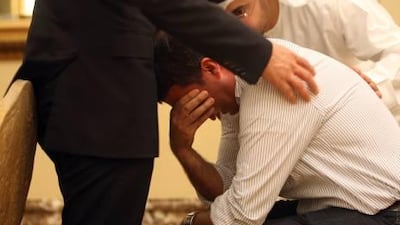ABU DHABi // Representatives of local councils from across Libya gathered in Abu Dhabi yesterday to endorse the rebel government established in Benghazi recently, in an attempt to signal the breadth of their support and their readiness to govern.
Altogether, about two dozen rebel councils are functioning across the country, from the besieged western city of Misurata, to the capital Tripoli, to Sirte, the central hometown of the defiant ruler Col Muammar Qaddafi.
Nine of those councils announced their support for the first time yesterday, after having formed their group, picked a representative and arranged travel - sometimes in secret to avoid arrest. Other councils are still forming, some are also underground.
"We announce unequivocally our allegiance to, and trust in, the National Transitional Council [NTC]," the nine newest councils said in a joint statement, referring to the rebel government.
"The more representative the council is, the more the international community will feel comfortable to offer full recognition," said Aref Ali Nayed, a co-ordinator for the executive body of the rebel government.
This week the delegates will travel to Qatar, then to Benghazi, to meet with the NTC.
Their trip comes as the rebels find themselves locked in battle while the international community debates how to provide more support for them.
In Misurata, Col Qaddafi's forces recently attacked the city's fuel supply and blocked access to the port through which humanitarian aid is received and refugees are ferried out.
In Rome last Thursday, an international "contact group" for Libya, which includes the US, European and Arab states, said it would set up a fund for the rebels.
The US said it would unfreeze a portion of US$30 billion (Dh110bn) in seized Libyan government assets to transfer to the rebels, while Kuwait pledged $180m to their cause and Qatar promised up to $500m in donations.
An NTC representative and a local-council delegate said yesterday that the UAE was providing funds as well.
Those went to pay salaries and other needs, said Ali Zaidan, a member of the rebel government's diplomatic team.
He said the most urgent need was for more weapons - something most nations of influence have been unwilling to provide, drawing the line instead at providing training for rebels or enforcing a no-fly zone.
The NTC was not permitted to purchase weapons with the UAE funds, Mr Zaidan said. Sirte delegate Hassan Aldroe said that, as an alternate means to acquire weapons, the rebel government hoped to receive the unfrozen assets or gain international recognition as the authority of Libya. Those were the priorities, he said.
The UAE has not officially recognised the group, but a senior official welcomed the delegates yesterday and "saluted" their efforts. The UAE government stood ready "to offer all the help and support for our brothers, the Libyan people," said Tariq al Haydan, assistant foreign minister for political affairs.
The UAE has provided food, medicine, tents and other humanitarian aid to the hundreds of thousands of refugees fleeing into neighbouring Tunisia and Egypt. It also sent 12 war planes to help carry out the no-fly zone approved by the UN Security Council and led by Nato.
Delegates yesterday recalled the violence and death they had witnessed in recent months - prompting a few men in the audience, many of them Libyan expatriates, to shed tears.
In Zwara, 300 young people had been taken away, said the representative Bin Sassi.
Still they vowed not to give up, often eliciting bursts of applause.
Their slogan, they said in their statement, was: "We do not surrender; we win or die."

